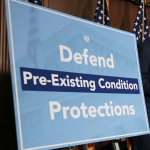The Food and Drug Administration has indicated on its 2019 agenda that it will enact a ban on using electrical shock devices on people with developmental disabilities. This comes after the disability rights group ADAPT staged a 12-day demonstration in support of the ban, which the FDA first proposed in 2016. The only U.S. facility known to use shock devices is the Judge Rotenberg Educational Center in Massachusetts.
A Texas judge has issued a ruling finding the 2010 Affordable Care Act unconstitutional. If upheld on appeal, this ruling would invalidate policies including health insurance protection for pre-existing conditions and Medicaid expansion. Liberal and conservative legal scholars have criticized the judge’s reasoning and say the ruling is likely to be overturned.
Hundreds of students with disabilities in Delaware schools attended the Transition Conference in Dover. Hosted by the Division of Vocational Rehabilitation, the conference featured representatives from state agencies, local businesses and other organizations encouraging attendees to make plans for employment or continued education after high school.
A bipartisan package of Medicaid bills called the IMPROVE Act has passed the U.S. House of Representatives and heads to the Senate. Among other things, the act will provide temporary funding for Money Follows the Person, a Medicaid program supporting people who transition from institutions to community living. This short-term fix is a compromise to keep the program running until lawmakers can pass a multi-year reauthorization.
Money Follows the Person, a Medicaid program that provides financial support to people transitioning from an institution to apartment or small group living, will be out of money at the end of the year unless the U.S. Congress passes a bill to fund it. Advocates are cautiously optimistic that Congress will pass the bill, or a short-term extension, before the session ends this week.





